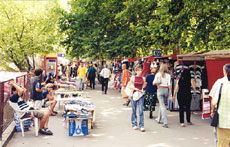Struggle for power continues

The open market is Yugoslavia´s version of Wal-Mart. It´s where the people buy their basic needs.
The dictatorial regime of Milosevic was strong against any attempt of overturn. It required a majority of political parties to unite together around the idea of collapsing Milosevic’s government.
They called on people for revolution and to fight for their future.
However, once the united parties succeeded, they started fighting among themselves for their own political programs and the leadership of the country.
Leaders of the Vojvodina region are following the example of previous states and looking for separation from Serbia. However, the rest of the parties are objecting to further divisions.
The same situation is happening with the state of Montenegro where opposition leaders are taken off the governmental functions due to activities that supported separatism. Therefore, they were blamed for espionage and sexual misconduct as propaganda to gain the public’s favoritism of their decisions. This seems to be a common practice, where political leaders are charging each other with accusations that are hard to investigate.
They are doing so in order to take them off their political functions and reduce their influencing power. On the other hand, political parties are blaming President Kostunica for an ignorant attitude for newly developed situations. They are accusing him of being on top of the political pyramid and still remaining completely uninformed. The country faced many scandals that attacked the integrity of the republic government, while the president still was uninformed, even during the arrest of the ex-president, Milosevic.
The leading political party, Democratic Opposition of Serbia, is splitting into two different directions.
One is headed by the Yugoslavian president, Vojislav Kostunica, while the other by Serbian prime minister, Zoran Djindjic.
This collapse of the leading political party reveals the facts about differences in understanding and attitudes toward the key problems of the country. The primary dispute is about International War Crime Court at Hag and the wanted list.
Those people are currently holding high political and military positions. They were active members of Milosevic’s government, and they helped overturn Milosevic’s dictatorship. In exchange, they signed secret pacts with current leaders of political parties as protections that they will not be send to Hag.
Such treaties are limiting the current government in approaching reforms. On the other hand, the main goal is the removal of criminal activities of the ex-government regime.
At the same time, many other issues are confronting the newly formed government. There is the existence of the ongoing problem of Kosovo, where nobody can even conceive a functional solution.
People are left with their problems, no hope and at the same time, expected to continue their lives like nothing happened. It is perceived that the international community is the only one striving to find a peaceful solution when neither side will ever be satisfied and agree upon terms of peace.
Corruption of the legal system is another problem where people win their cases with open and publicly announced briberies. However, judges are never taken off their duties and punished for such criminal activities.
Overall, the crisis in the economy led to inflation, massive layoffs, strikes and decreased efficiency.
Recently, liberalized media are still walking the road of the previous regime and reporting news in unprofessional way.
At the same time, media are being taken to court for their freedom of expression.
Furthermore, the autonomy of universities did not exist until recently where students still did not have the right to form and operate student organizations. However, problems still continue to arise.
The international community is concerned about military problems.
The mafia is still obviously nesting its deal with the government. This is very often in relationships with members of paramilitary troops and war crimes in previous wars.
Serbia is still finding massive graveyards across the republic as a cover up of deeds of the old government regime. However, there are many other problems that are requiring immediate attention and reconstruction.
Your donation will support the student journalists of Missouri Southern State University. Your contribution will allow us to purchase equipment and cover our annual website hosting costs.



























